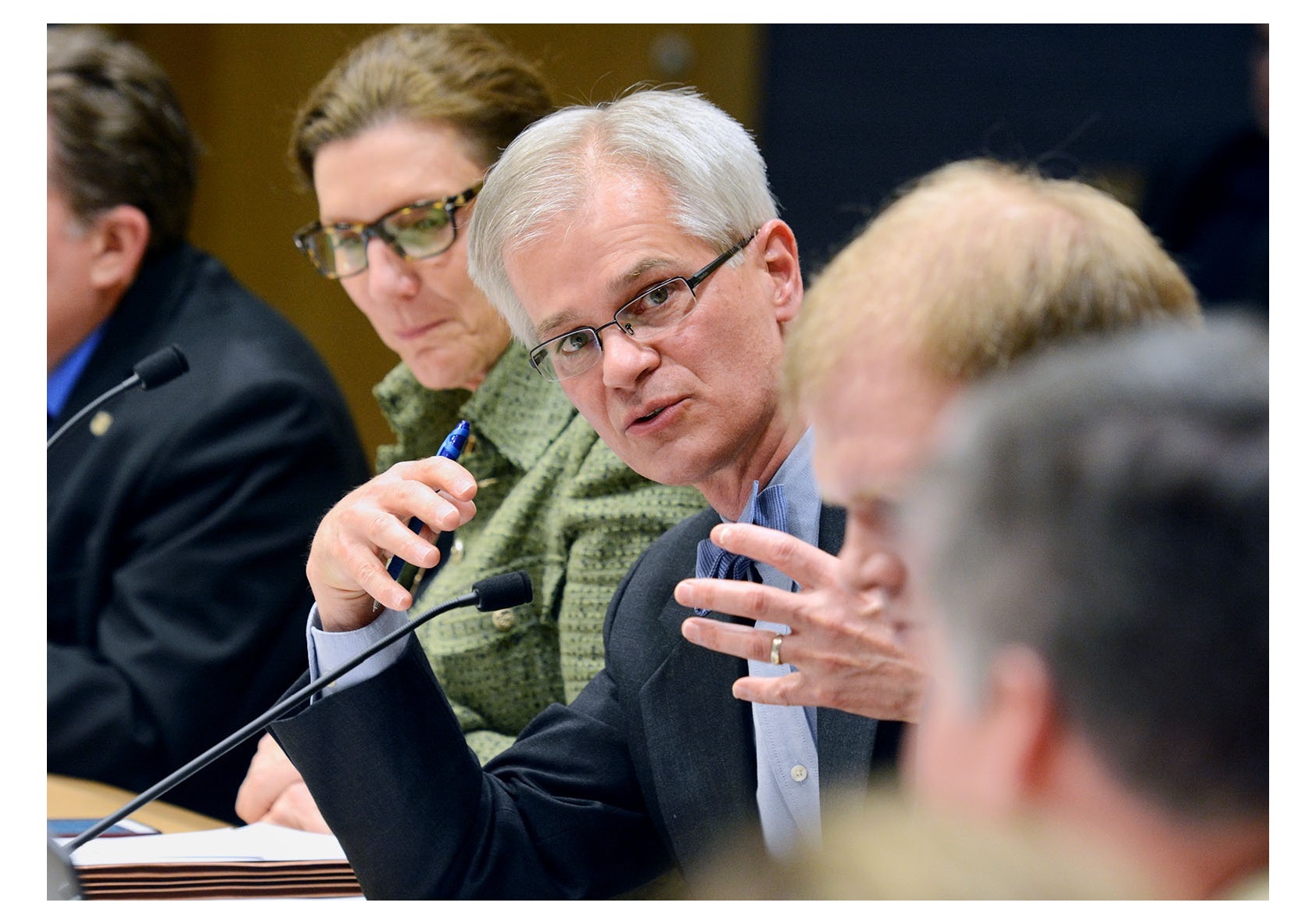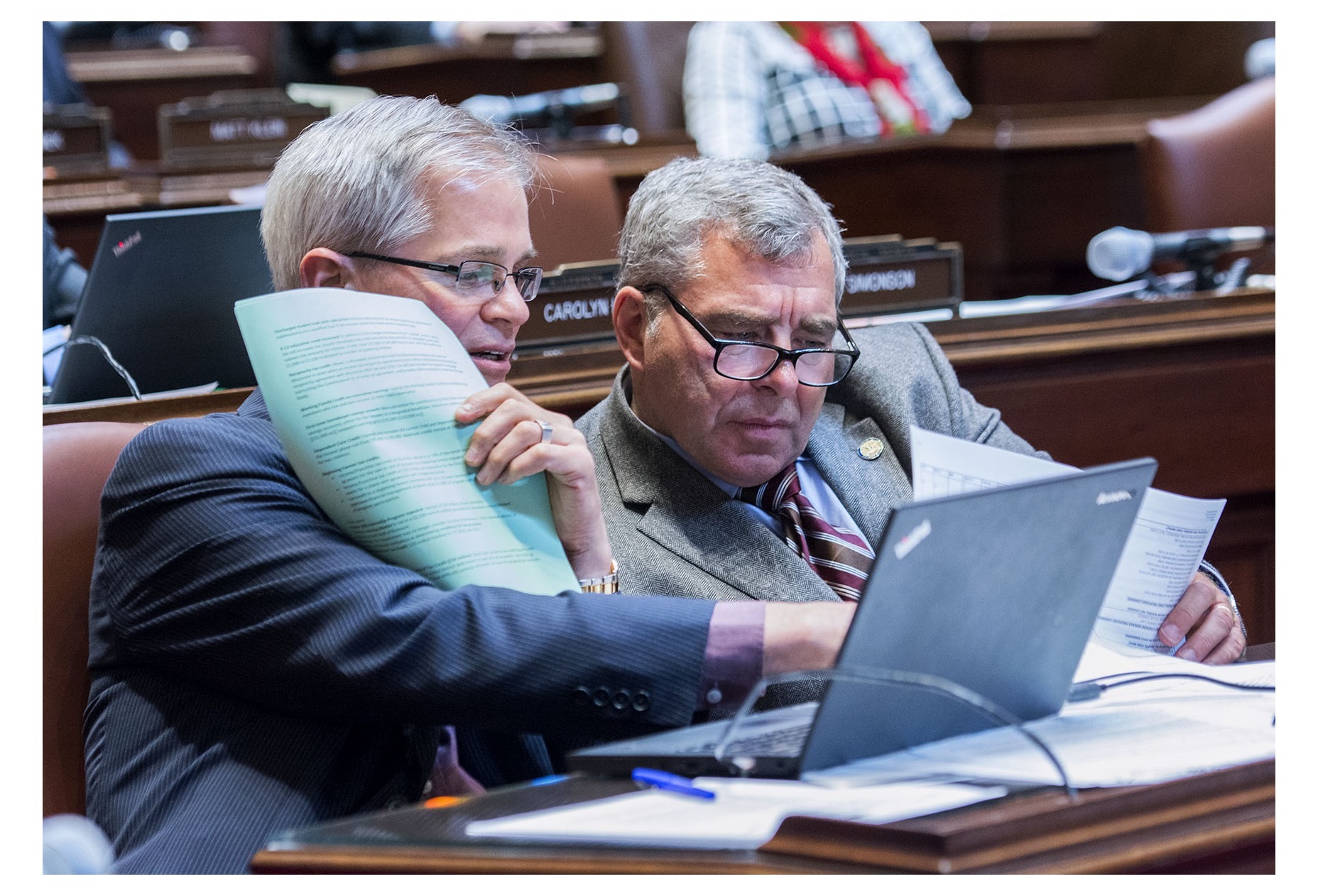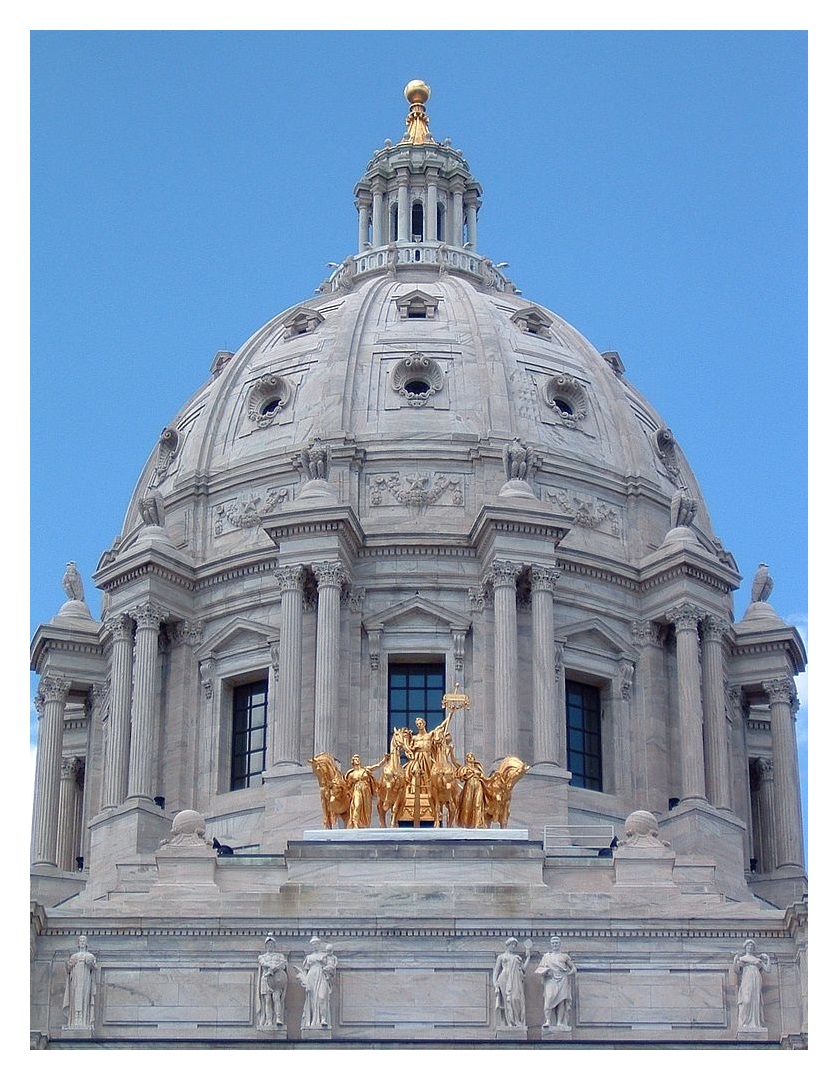|
Dear
Friends,
Now
that
the
2017
legislative
session
has
wrapped
up,
I
am
writing
to
share
my
perspectives
on
the
results
of
the
legislative
session.
It
was
a
particularly
challenging
year
and
much
of
my
work
was
devoted
to
fighting
against
attempts
to
roll
back
environmental
laws
and
working
to
remove
harmful
policies
buried
in
the
state
budget
bills.
I
was
frustrated
by
both
the
outcome
and
the
flawed
legislative
process
that
lacked
transparency
and
accountability.
As
I
look
ahead,
I
want
to
reform
the
legislative
process
and
see
Minnesota
focus
on
bold
proposals
that
will
improve
our
health,
environment
and
communities.
We
need
to
tackle
our
problems,
not
tinker
with
them.
Please
join
me
at
a
town
hall
meeting
that
I
am
hosting
with
Rep.
Alice
Hausman
and
Rep.
John
Lesch
to
discuss
legislative
actions:
Town
Hall
Forum
with
Sen.
Marty,
Rep.
Hausman,
&
Rep.
Lesch
Wednesday,
July
5th,
6:30-8:30pm
Location:
State
Office
Building,
Room
10
100
Rev
Dr.
Martin
Luther
King
Jr.
Boulevard,
St.
Paul
MN
Please
enter
through
the
North
entrance
(door
facing
University
Ave
and
Light
Rail).
Click
here
for
a
map
showing
nearby
parking
locations,
with
the
State
Office
Building
highlighted
in
bright
blue.
We
hope
you
can
join
us!
Sincerely,

John
Marty
A
Flawed
Legislative
Process
I
was
disheartened
to
see
the
lack
of
transparency
and
accountability
on
display
during
this
legislative
session.
Most
of
the
policy
adopted
by
the
2017
legislature
was
contained
in
less
than
a
dozen
pieces
of
legislation.
Most
budget
and
policy
decisions
were
made
by
a
handful
of
legislators,
often
hidden
from
other
legislators
who
are
excluded
from
the
process.
These
bills
which
contained
different
portions
of
the
state
budget
also
had
hundreds
of
different,
often
controversial,
policies
included
in
them.
Legislators
often
insert
their
legislative
proposals
into
budget
bills
so
that
they
are
able
to
get
bills
passed
that
do
not
otherwise
have
the
support
needed
to
pass.
It
allows
harmful
provisions
to
be
slipped
into
bills
that
contain
the
funding
necessary
to
operate
state
government,
without
a
chance
for
legislators
to
vote
for
or
against
those
provisions.
This
effectively
holds
some
provisions
hostage,
with
legislators
being
forced
to
accept
policies
they
consider
harmful
in
order
to
pass
a
budget.
Not
only
does
this
reduce
accountability,
but
it
also
violates
the
Minnesota
Constitution
which
states,
“No
law
shall
embrace
more
than
one
subject...”
In
addition,
the
public
has
no
ability
to
know
about
proposed
policies
until
after
they
are
enacted,
or
to
know
the
positions
of
their
elected
representatives
on
those
provisions.
These
“garbage
bills”
often
contain
unrelated
provisions—there
was
a
provision
establishing
a
licensure
process
for
“eyelash
technicians,”
inserted
in
a
bill
funding
state
agencies.
Whether
that
provision
is
desirable
or
not,
it
should
be
voted
on
separately
so
it
can
stand
or
fall
on
its
own
merits.
To
add
to
the
problems
caused
by
these
violations
of
the
constitution’s
single
subject
requirement,
the
legislative
process
has
seldom
given
legislators
time
to
read
and
understand
these
large
compilations
of
budget
and
policy,
and
this
year’s
process
was
one
of
the
worst.
Many
conference
committee
reports
containing
hundreds
of
pages
were
available
to
Senators
and
the
public
only
a
few
hours
before
the
bills
were
presented
on
the
Senate
floor.
Much
of
the
legislative
action
was
taken
in
the
middle
of
the
night.
All
of
this
fails
to
meet
even
a
minimal
level
of
public
transparency
and
accountability.
Over
the
years,
I
have
spoken
out
against
these
harmful
practices,
and
as
these
abuses
of
the
legislative
process
have
become
worse,
I
have
become
more
vocal.
This
year,
I
offered
amendments
to
strip
policy
provisions
out
of
each
of
the
budget
bills,
and
when
those
efforts
failed,
I
filed
a
rare
“protest
and
dissent”
that
the
constitution
offers
legislators
as
a
last
resort.
At
this
time,
I
am
exploring
a
lawsuit
to
force
the
legislature
to
stop
violating
the
Constitution.
I
don’t
take
this
step
lightly,
but
if
the
legislature
is
unwilling
to
uphold
the
constitution,
the
courts
need
to
step
in.
Environment
and
Energy
As
the
ranking
minority
member
of
the
Senate
Energy
Committee,
I
fought
against
a
number
of
bills
that
would
roll
back
Minnesota’s
sustainable
energy
policies
or
weaken
environmental
protection.
Unfortunately,
one
of
the
budget
bills
contained
many
of
these
damaging
policies.
Among
these
provisions
were:
- Repeal
of
a
2013
law
that
created
a
long-term
planning
process
to
transition
the
state
to
a
renewable
energy
future
- A
measure
exempting
certain
utilities
from
Public
Utilities
Commission
oversight,
which
ensured
that
customers
were
treated
fairly
- A
measure
exempting
small
energy
utilities
from
participating
in
energy
saving
and
efficiency
requirements
- Creating
a
legislative
takeover
of
the
Renewable
Development
Fund,
which
had
been
an
effective
tool
for
encouraging
wind
and
solar
power
development
around
the
state.
Legislators
plan
to
use
the
money
for
purposes
different
from
those
for
which
the
fund
was
created.
These
provisions
will
set
back
Minnesota’s
efforts
to
address
climate
change,
and
will
hurt
Minnesota’s
economy
and
the
many
Minnesota
businesses
that
are
in
the
renewable
energy
field.
I
continue
to
advocate
for
Minnesota
leadership
in
clean
energy
and
believe
we
should
be
moving
forward,
not
backwards
in
these
initiatives.
Health
Care
 On
both
the
federal
and
state
level,
this
year’s
proposals
to
“fix”
health
care
are
going
to
make
the
problem
worse,
not
better.
Republican
legislators
passed
a
proposal
that
would
allow
HMOs
to
become
“for-profit”
businesses.
Unfortunately,
under
the
new
law,
these
companies
could
take
public
assets
and
convert
them
into
private
assets
for
wealthy
executives.
This
will
not
improve
our
health
care
system.
The
legislature
also
put
more
than
$800
million
into
efforts
to
stabilize
the
health
insurance
market—an
extremely
costly
attempt
to
temporarily
address
problems
for
the
five
percent
of
Minnesotans
who
buy
in
the
individual
market,
yet
the
legislation
fails
to
guarantee
that
insurers
will
offer
affordable
coverage
in
all
parts
of
the
state. On
both
the
federal
and
state
level,
this
year’s
proposals
to
“fix”
health
care
are
going
to
make
the
problem
worse,
not
better.
Republican
legislators
passed
a
proposal
that
would
allow
HMOs
to
become
“for-profit”
businesses.
Unfortunately,
under
the
new
law,
these
companies
could
take
public
assets
and
convert
them
into
private
assets
for
wealthy
executives.
This
will
not
improve
our
health
care
system.
The
legislature
also
put
more
than
$800
million
into
efforts
to
stabilize
the
health
insurance
market—an
extremely
costly
attempt
to
temporarily
address
problems
for
the
five
percent
of
Minnesotans
who
buy
in
the
individual
market,
yet
the
legislation
fails
to
guarantee
that
insurers
will
offer
affordable
coverage
in
all
parts
of
the
state.
These
misguided
“reforms”
like
the
proposed
AHCA
in
Washington
make
it
clear
that
we
need
a
new
approach
to
financing
health
care.
Temporary
fixes
and
increased
help
for
insurance
companies
will
not
solve
problems
or
improve
care
in
the
long
term.
This
session,
my
bill
to
create
the
Minnesota
Health
Plan
was
co-authored
by
two-thirds
of
DFL
legislators
who
recognized
it
as
the
positive
and
affordable
solution
to
our
health
care
crisis.
The
Minnesota
Health
Plan
would
replace
our
health
insurance
system
with
health
care
for
all.
It
would
cover
all
Minnesotans
for
all
of
their
medical
needs
including
dental,
long
term
care,
mental
health
and
prescription drugs.
This
bill
would
establish
a
much-needed
doctor
and
patient-centered
system.
Medical
decisions
should
be
made
by
patients
and
their
doctors,
not
insurance
companies,
government,
or
employers.
Taxes
and
Financial
Stability
I
am
concerned
that
the
state’s
financial
stability
has
been
significantly
weakened
by
irresponsible
budget
practices
this
year.
Particularly
in
the
Transportation
and
Human
Services
budgets,
the
legislature
shifted
costs
and
delayed
payments
to
future
years—effectively
“spend
now
and
pay
later.”
In
addition
to
these
financial
gimmicks
and
spending
large
sums
of
money
to
subsidize
health
insurance,
the
legislature
passed
huge,
unsustainable
tax
cuts
for
the
benefit
of
wealthy
taxpayers
and
big
businesses.
I
am
deeply
concerned
that
this
tax
bill
and
the
overall
reliance
on
cost
shifts
and
payment
delays
will
create
budget
deficits
in
future
years.
We
began
the
year
with
a
$1.6
billion
surplus,
but
with
these
irresponsible
budget
priorities
we
are
hurting
the
state’s
future
simply
for
the
sake
of
giving
tax
cuts
to
some
of
the
wealthiest
people
in
our
state.
Transportation
Minnesota
has
many
unmet
transportation
needs.
Unfortunately,
this
session’s
transportation
funding
bill
provides
far
less
than
transportation
experts
tell
us
is
necessary
to
maintain
our
current
roads
and
bridges
and
make
strategic
improvements
to
infrastructure.
Also,
rather
than
raise
new
transportation
funds,
the
budget
shifts
dollars
from
the
state’s
general
fund,
taking
money
from
other
important
needs.
As
a
strong
supporter
of
affordable
public
transit,
I
recognize
its
importance
to
hundreds
of
thousands
of
Minnesotans,
and
the
benefits
to
everyone
from
less
traffic
congestion
and
cleaner
air.
I
was
dismayed
by
the
grossly
inadequate
transit
funding
that
Republicans
included
in
the
bill.
This
could
lead
to
a
downward
spiral
in
our
transit
system.
We
need
to
invest
in
reliable
and
accessible
public
transit
options
that
serve
all
Minnesotans,
instead
of
forcing
service
cuts
and
increased
fares.
To
move
Minnesota
forward
on
transit,
I
authored
Senate
File
2316
to
reduce
transit
fares
all
the
way
down
to
25
cents
per
ride.
This
legislation
would
lead
to
significant
increases
in
transit
ridership
(potentially
doubling
ridership
within
a
couple
years)
which
would
lead
to
the
need
for
more
frequent
service
and
more
routes—effectively
leading
to
an
upward
spiral
in
transit
use
and
availability.
All
of
this
would
result
in
significant
economic
savings
to
riders—especially
important
for
many
low-income
workers
and
seniors.
It
would
also
be
the
least
expensive
way
to
address
traffic
congestion
in
the
metro
area,
and
would
lead
to
a
cleaner
environment.
Good
transit
systems
are
an
asset
to
the
health,
economy
and
environment
of
our
state,
and
I
will
continue
to
work
for
improved
transit
and
oppose
bills
that
do
not
provide
adequate
funding.
Education
 Due
to
strong
advocacy
from
Governor
Dayton,
the
education
finance
bill
that
passed
during
special
session
significantly
increased
funding
for
schools,
providing
an
additional
$483
million
over
the
next
two
years,
including
a
2%
increase
to
the
per-pupil
funding
formula.
However,
this
amount
will
hardly
cover
inflation,
and
some
districts
will
still
need
to
make
budget
cuts.
Minnesota
students
deserve
a
high
quality
education,
and
while
this
bill
is
an
improvement
over
earlier
proposals,
I
am
disappointed
that
we
are
not
doing
more
to
provide
the
funding
and
resources
educators
and
kids
need. Due
to
strong
advocacy
from
Governor
Dayton,
the
education
finance
bill
that
passed
during
special
session
significantly
increased
funding
for
schools,
providing
an
additional
$483
million
over
the
next
two
years,
including
a
2%
increase
to
the
per-pupil
funding
formula.
However,
this
amount
will
hardly
cover
inflation,
and
some
districts
will
still
need
to
make
budget
cuts.
Minnesota
students
deserve
a
high
quality
education,
and
while
this
bill
is
an
improvement
over
earlier
proposals,
I
am
disappointed
that
we
are
not
doing
more
to
provide
the
funding
and
resources
educators
and
kids
need.
One
of
the
problematic
policies
included
in
the
education
budget
was
a
new
four-tier
license
system
that
threatens
teacher
quality.
The
licensure
system
needed
reform,
but
this
new
policy
is
not
well
designed.
I
am
pleased
that
the
Perpich
Center
for
Arts
Education
will
remain
open
and
that
private
school
credits
that
would
have
diverted
funding
from
public
education
were
removed
from
the
final
bill.
Economic
Justice
More
than
one
in
ten
Minnesotans
lives
in
poverty.
Three
in
ten
struggle
to
meet
basic
needs.
Some
workers
cannot
afford
housing
and
go
from
their
jobs
to
a
homeless
shelter
at
night.
No
one
should
face
a
situation
where
they
are
working
hard
yet
still
living
in
poverty
and
unable
to
pay
for
necessities.
This
session,
I
introduced
an
economic
justice
proposal
to
move
Minnesotans
out
of
poverty
by
providing
phased-in
increases
in
the
minimum
wage
and
more
than
doubling
the
working
family
tax
credit.
High
childcare
costs
continue
to
be
a
problem
for
many
working
families,
so
the
bill
would
also
increase
affordable
childcare
and
boost
reimbursements
so
childcare
providers
get
decent
wages
and
parents
can
receive
high
quality
childcare.
In
addition,
welfare
benefits
have
not
had
a
single
increase
in
over
thirty
years,
so
this
legislation
would
finally
increase
the
payments
to
assist
families
living
in
poverty.
We
urgently
need
this
legislation
and
I'll
continue
working
for
it
next
year.
REAL
ID
and
Drivers'
Licenses
I
am
pleased
that
the
legislature
passed
a
neutral
REAL
ID
bill
allowing
Minnesotans
to
board
domestic
flights
without
a
passport
or
additional
documents.
After
months
of
game-playing,
Republican
legislators
eventually
pulled
unrelated
immigration
policy
language
from
the
bill.
With
the
passage
of
this
bill,
the
state
will
begin
issuing
REAL
IDs
by
October
2018.
Unfortunately,
the
controversial
provision
preventing
undocumented
immigrants
from
getting
driver’s
licenses
that
was
removed
from
the
REAL
ID
bill
was
later
inserted
in
the
final
Judiciary
and
Public
Safety
bill.
I
opposed
this
provision,
which
will
reduce
public
safety.
Immigrants
who
live
in
Minnesota
communities
are
driving,
and
it
is
far
safer
to
allow
them
to
get
licenses,
which
means
they
can
get
insurance
and
appropriate
training.
Contact
Information
for
Senator
Marty
It
is
an
honor
to
represent
you
in
the
Senate
and
I
appreciate
the
many
phone
calls,
email,
mail
and
visits
to
my
office.
Please
continue
to
keep
in
touch.
My
email
is
jmarty@senate.mn
and
my
Legislative
Assistant,
Elspeth
Cavert,
can
be
reached
at
elspeth.cavert@senate.mn.
Our
office
is
in
the
MN
Senate
Building,
room
2401.
You
can
reach
us
at:
2401
Minnesota
Senate
Building
St
Paul,
MN
55155
651-296-5645
State
Capitol
Grand
Reopening

After
four
years
of
restoration,
the
Minnesota
State
Capitol
is
now
open
to
the
public.
Our
beautiful
Capitol
has
been
returned
to
its
former
glory
and
is
ready
for
the
next
100
years.
To
commemorate
this
special
occasion
and
to
invite
Minnesotans
back
to
the
People’s
House,
there
will
be
a
Grand
Opening
Celebration
held
on
August
11,
12,
and
13.
The
celebration
will
include
fireworks,
concerts,
demonstrations
by
the
artisans
that
worked
on
the
restoration,
behind
the
scenes
tours,
and
much
more.
With
featured
events
to
entertain
Minnesotans
of
all
ages
from
all
corners
of
the
state,
the
Grand
Opening
weekend
will
be
educational,
interactive
and
fun!
Most
of
the
events
are
free,
or
offered
at
a
very
low
cost.
Please
mark
your
calendars
to
celebrate
the
People’s
House
this
summer!
For
detailed
information
on
the
weekend,
please
visit
www.mn.gov/mymncapitol. |